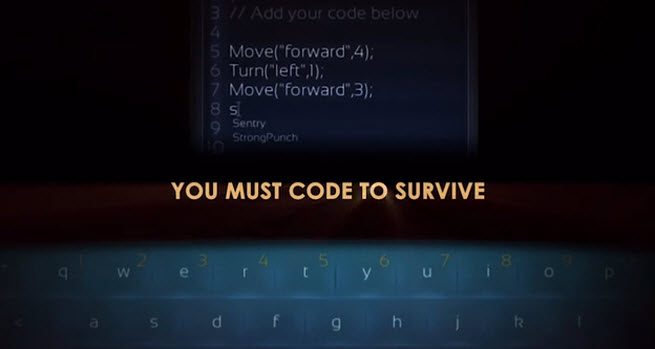Hakitzu is a mobile-strategy game where two robots square off against each other on a grid. It teaches the JavaScript programming language through a battle arena. To make a mech robot warrior maneuver and fight, the player has to write increasingly sophisticated code that allows it to perform functions such as movement, targeting, and firing.
San Francisco-based Kuato wants to “gamify” education, or use game mechanics to get kids interested in non-game applications such as learning computers.
AI Weekly
The must-read newsletter for AI and Big Data industry written by Khari Johnson, Kyle Wiggers, and Seth Colaner.
Included with VentureBeat Insider and VentureBeat VIP memberships.
“We are focused on making coding fun,” said Frank Meehan (pictured right), the chief executive of San Francisco and London-based Kuato, in an interview with GamesBeat. “We want to innovative when it comes to teaching our kids. The whole point is to get kids to learn, but it is targeted at anyone who wants to program.”
Kuato set out to make a series of games. It hasn’t yet finished the title that it showed last year, which featured a planet where children could explore and terraform by writing programs. That game will tap artificial intelligence technology, licensed from research firm SRI International, which adapts the difficulty level based on the player’s programming skill.
Hakitzu has been tested in schools with proven results. (Here’s a testimonial from Eric Sheninger, the principal of New Milford High School in New Jersey). Players are assigned a “code warrior,” and you can hack the robot in a “chop shop.” You can add weapons by writing snippets of code. Then you can enter the battle arena. The player takes a turn, coding instructions to make the robot perform an action, and then the computer opponent takes a turn.
The game has a full tutorial that you can play through in order to learn code. A virtual keyboard makes it easier for kids to write their code since it is customized for keys that are commonly used in programming. If you type an error in your code, the game will tell you and highlight the problem. It has three arenas.
“Nobody has done anything like this before,” Meehan said. “By the end of it, you will learn variables, functions, core construction of code, and syntax for JavaScript. That’s just the first pack.”
[aditude-amp id="medium1" targeting='{"env":"staging","page_type":"article","post_id":705423,"post_type":"story","post_chan":"none","tags":null,"ai":false,"category":"none","all_categories":"business,dev,games,mobile,","session":"B"}']
“I’ve learned that no one has managed to pull this off because it’s hard,” Meehan said.
But lots of folks want to see Kuato succeed. SRI, the same research institute that created the A.I. technology behind Siri, is one of Kuato’s investors.
Siri spun out of SRI International and was acquired by Apple for use it its iPhone. SRI did ground-breaking work on virtual personal assistant (VPA) technology as part of its Cognitive Assistant that Learns and Organizes (CALO) project started in 2003. Kuato has the license to the technology in the gaming and entertainment industries.
[aditude-amp id="medium2" targeting='{"env":"staging","page_type":"article","post_id":705423,"post_type":"story","post_chan":"none","tags":null,"ai":false,"category":"none","all_categories":"business,dev,games,mobile,","session":"B"}']
Meehan founded the company in November 2011 with funding from SRI and Horizons Ventures. Before that, he had been part of the Horizons Ventures team and was a former board member on both Spotify and Siri. He was the leader of a group that created a Skype phone in 2007 and also the INQ1 handset. His current team includes veterans of video game companies Rockstar Games, Konami, Sony, and other firms. Kuato has 22 employees.
VentureBeat's mission is to be a digital town square for technical decision-makers to gain knowledge about transformative enterprise technology and transact. Learn More

